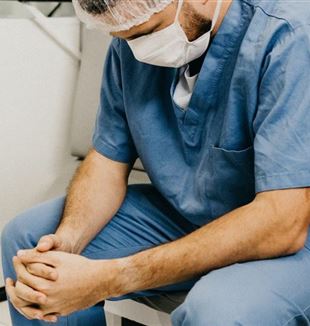
Not even protective wear can obstruct the heart
He is a doctor in an intensive care unit in Cagliari, dealing with Coronavirus. A once routine gesture can now become a “grace”.I never, ever would have imagined that the last months of my professional career would be like this. Within two weeks, I found myself inside the whirlwind of the Coronavirus emergency that has turned my life upside down: at home, in the hospital, and which has all of our lives.
I have been catapulted into directing an emergency situation that has led me, even though I never wished to be the protagonist, to organise more intensive care beds, together with some colleagues. I have been forced to immerse myself fully into a particular form of suffering that, although I am familiar with it because I have been working in intensive care for a long time, was unpredictable and delicate, although not as dramatic as the situation experienced by my colleagues in Lombardy.
The first patient, before being sedated and intubated, was awake. I had a short chat with him, so that I could empathise with him and get some medical information from him. A few minutes later, he was hooked up to a machine that pushed air into his lungs, in a cushioned and silent environment that would have been unimaginable before Coronavirus.
This is the relationship I have with the sick, in silence. A silence consisting of numbers, percentages, values, diagrams and monitor images. This is my being a doctor in there, in that intensive care room, in a protective suit that obstructs and prolongs the execution of every trivial routine medical task. Gestures within the silence and time is incredibly protracted, which almost allows you to weigh up your every action. You know very well that this protraction is only apparent: the severity of the illness, the urgency and the frenzy of the emergency catapult you immediately back into reality.
It is a frightening silence that makes you say: "God, what are you asking of me?" Then you think of that person who will no longer be able to speak or relate to us, who will have to be kept sedated in order to treat a new, unknown and unpredictable enemy. And who might die without a loved one caressing them one last time.
Yet, within all this, the Grace of sharing the same fear, the same inconsistency, the same weak faith with other people in my hospital, who were strangers until now, seems to have mitigated the burden of living. Perceiving the beauty and pleasure of receiving the Eucharist, thanks to my chaplain friend, is a sensation that I never thought I would experience. I was reminded of and I discovered myself with the same heart as when, years ago, I left on mission with my wife: totally "entrusted".
Read also - "Changed by a preference"
“Faith that flourished on the extreme boundary of the rational dynamic as a flower of grace to which man adheres with his freedom,” said Fr. Giussani, as Carrón reminds us in one of his letters. Now, more than ever, Christ takes advantage of this circumstance to allow us to experience the relevance of his Presence, comprised of sharing, charity, and the fraternal affection of friends and of the Church.
Roberto, Cagliari, Italy#Coronavirus